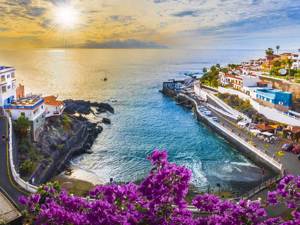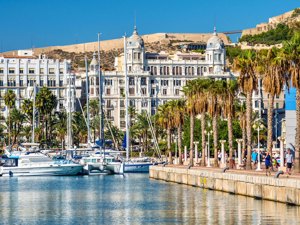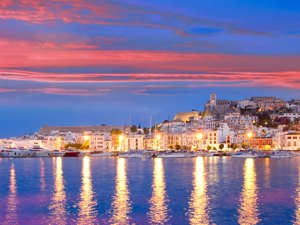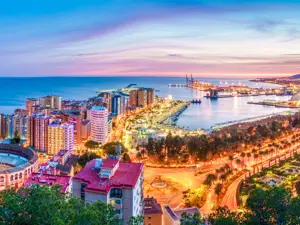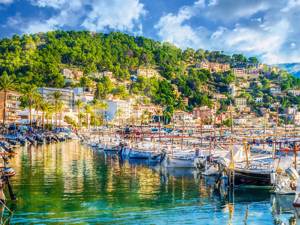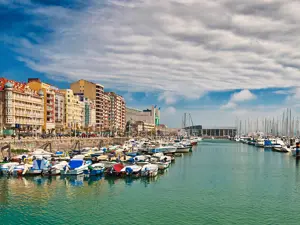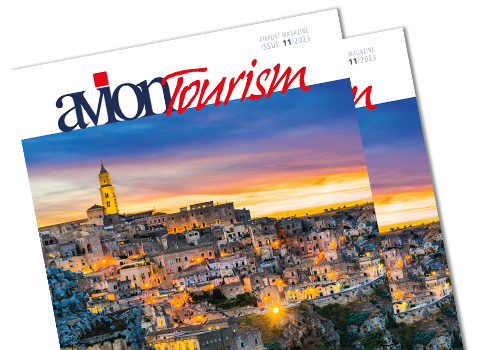A natural paradise
The Enchanting Island of La Palma is located in the vast archipelago of the Canary Islands, and is a hidden gem waiting to be discovered and explored. The island of La Palma, known as "La Isla Bonita" (The Beautiful Island), offers fascinating breathtaking landscapes, unspoiled nature and a relaxed atmosphere, ideal for a rejuvenating holiday.

La Palma. Photo: Copyright © Sisterscom.com, Depositphotos
La Palma is a natural paradise off the beaten tourist track with heavenly landscapes and unique beaches that allows you to experience ecological and active tourism. It is no coincidence that it is the greenest in the Canary archipelago and has been declared a Biosphere Reserve by UNESCO, thanks to its numerous protected natural spaces and its Caldera de Taburiente National Park.

La Palma, Caldera de Taburiente National Park. Photo: Copyright © Sisterscom.com, Depositphotos
The island is the perfect destination for those who love nature because here they are fascinated by scenic wonders. In fact, the island of La Palma is characterized by a unique geography, with imposing volcanic peaks, dense laurel forests, deep gorges and spectacular cliffs that plunge into the blue Atlantic. One of the most scenic spots is the Caldera de Taburiente National Park, a huge caldera surrounded by high rock walls, where you can hike to take in stunning views of the valley below.

La Palma, Caldera de Taburiente National Park. Photo: Copyright © Sisterscom.com, Depositphotos
But on the island there are other natural parks to visit such as the Las Nieves Natural Park with laurel forests and waterfalls (between the municipalities of Puntallana, San Andrés, Sauces and Santa Cruz de la Palma) or the Cumbre Vieja Natural Park characterized by volcanic cones in the Lauraceae wooded area, on the slopes of the Cumbre Nueva.

La Palma, Roque de los Muchachos. Photo: Copyright © Sisterscom.com, Depositphotos
The island of La Palma is also the right place for stargazing. For astronomy enthusiasts, La Palma is a true paradise thanks to its incredibly dark night sky and free of light pollution. The Roque de los Muchachos, one of the highest points on the island, is home to an international astronomical observatory that allows you to observe the wonders of the cosmos.

La Palma, Path of the Volcanoes. Photo: Copyright © Sisterscom.com, Depositphotos
La Palma is also an ideal destination for lovers of ecotourism and outdoor activities. There are numerous opportunities for trekking on the island, thanks to several well-marked trails that pass through forests and nature reserves. For example, the Path of the Volcanoes is very well known, a circular route through the heart of the volcanic nature of the island.

Beaches of La Palma . Photo: Copyright © Sisterscom.com, Depositphotos
In La Palma , the beaches are wild, unspoiled and away from the crowds. The coasts of the island are dotted with small bays and inlets, where you can relax in the sun and swim in crystal clear waters. Among the most popular beaches is Playa Nogales, with its distinctive contrast between black sand and cobalt blue waters. It was the volcanic lava (from volcanoes such as Teneguía and Cumbre Vieja) that reached the seashore, shaping a low and rocky coastline, full of small coves between the rocks overlooking the water. To watch the sunrise over a thin black sand beach, you can go to the island's capital to the artificial beach of Santa Cruz de La Palma, known as Caleta del Varadero and where the Avenida Marítima overlooking the Atlantic Ocean is located.

Beaches of La Palma . Photo: Copyright © Sisterscom.com, Depositphotos
The culture and traditions of the island are also fascinating. La Palma boasts a rich culture and authentic traditions that are rooted in indigenous Guanche influences and colonial past. The architecture in La Palma reflects different cultural influences and to discover it you can admire the Casa Salazar, the Royal Sanctuary of Our Lady of the Snows, the Church of El Salvador and the Castle of Santa Catalina in Santa Cruz de la Palma.

La Palma, Santa Cruz de la Palma, architecture. Photo: Copyright © Sisterscom.com, Depositphotos
While Flemish art introduced by settlers after the annexation of the island to the Crown of Castile, can be seen in the Church of San Francisco and the Church of Santo Domingo, in the capital, and the Church of San Andrés Apóstol in San Andrés y Sauces. To learn more about the history of the island, you can visit the Benahorita Archaeological Museum or the Insular Museum.

La Palma, Santa Cruz de la Palma, San Francisco square with the church. Photo: Copyright © Sisterscom.com, Depositphotos
During your stay on the island you can attend local holidays, from small to large events, such as "The Indians at Carnival", the Quinquennial Festivals (held every five years, known as the Descent of Our Lady of the Snows during the first two weeks of July), the Great Week and the Small Week or the Dance of the Dwarves.
During events and festivals, you can also admire the textile or cigar handicrafts and taste the famous cheeses and wines of the Saborea La Palma quality brand. Tasting traditional Canarian cuisine and immersing yourself in the cozy atmosphere of the island's villages and towns is part of this emotional journey to the island.
Typical products and cuisine of La Palma

Cracklings. Copyright © Sisterscom.com, Depositphotos

Malvasia wine. Copyright © Sisterscom.com, Depositphotos

Chickpea soup. Copyright © Sisterscom.com, Depositphotos
Among the typical products you can taste chicharrones (cracklings), sopa de picadillo (soup with minced white meat), chickpea soup, kid in sauce, grilled pork, vieja guisada (parrotfish stew), fried alfonsino, roasted patudo (bluefin tuna) and, for dessert, rapadura, almendrados, Bienmesabe or Prince Albert. Flavors to be enhanced with wines (called "tea" for the fermentations in Canarian pine wood barrels) and Malvasia wines, praised by Shakespeare in several works for their sweet note.
Edited by Enzo Cuppatri
Avion Tourism Magazine
Photo: Copyright © Sisterscom.com, Depositphotos
All rights reserved. Copyright © Sisterscom.com
Video: www.ciaoisolecanarie.com
Tourist Boards
www.ciaoisolecanarie.com
www.spain.info
Partnership with Booking.com
Where to stay in La Palma
 Santa Cruz de La Palma, La Palma. Photo: Copyright © Sisterscom.com, Depositphotos
Santa Cruz de La Palma, La Palma. Photo: Copyright © Sisterscom.com, Depositphotos HOUSES, RESORTS, B&BS
Stays in houses, B&Bs and hostels:
CAPITAL
Hotels in the capital of the island:
OTHER LOCATIONS
Hotels in the island's towns:
OTHER LOCATIONS
Hotels in the island's towns:
Destinations found in the vicinity
Other destinations





